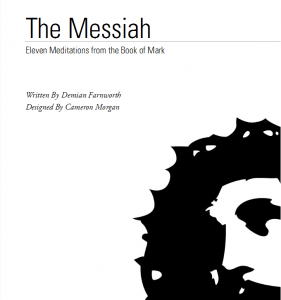
You can start reading a PDF version of right now.
In a two month period back in August and September of 2009 I published several articles on specific events in Jesus’ life found in the book of Mark.
Events that demonstrate his unlimited power over nature, sickness, and demons. Events that strike terror. That create awe. That even hardens hearts.
But hardened hearts indicate one thing: They knew Jesus to be dangerous.
Jesus is dangerous. And glorious. And worthy to be worshipped. He’s not tame nor tranquil, but terrifying to the wicked and triumphant to the humble.
It’s these events that provoked Peter to declare, “You are the Christ.” And it’s these events that provoke the righteous to fall to the ground and declare, “You are our Savior.”
And that is the appropriate response to the one who came to earth to bear the punishment for our sins so that we might live. Jesus is God as man. In the end, that is who these events declare Jesus truly is.
so that we might live. Jesus is God as man. In the end, that is who these events declare Jesus truly is.
And so I’ve pulled these articles together in one post. And I even had them transformed into a PDF version: .
Read the individual articles here.
Son of Man: Something You Will and Won’t See
Several things happened the day Jesus healed a crippled man. Several things nobody saw but believe in fact did happen. [Mark 2:1-12]
How the Conquered Storm Points to Christ
The story of Jesus stilling the tempest demonstrates Jesus’ unlimited power and the two ways we can respond to this power. [Mark 4:35-41]
The Demoniac Proclamation of Christ
There’s something quite potent to the story of the demon-possessed man that drives the heart of a Christian to it. [Mark 5:1-20]
The Scandal of Jesus in Nazareth
In the small, isolated village of Nazareth Jesus taught one Sabbath day. Everything as it should be. Except for one thing. [Mark 6:1-6]
The Messiah: Peter’s Confession of Christ
Peter confessed Jesus was Christ. Who do you say Jesus is? The answer will determine your eternal destiny. [Mark 8:27-30]
Discipleship: The Law of the Cross Prevails
What does it mean to follow Christ? In just 100 words Jesus taught his disciples the price they must pay to follow him. [Mark 8:34-38]
Transfiguration: An Otherworldly Peek at the Messiah
Jesus’ transfiguration had two very specific purposes. Here’s what you need to know. [Mark 9:2-13]
Anointed: A Reckless but Beautiful Act of Worship
Jesus said Mary’s one act of reckless worship was beautiful. What are you willing to risk for Jesus that he might describe as beautiful? [Mark 14:3-9]
Failure: Peter’s Denial of Jesus Christ
All four gospels record Peter’s betrayal. The purpose? To draw a vivid distinction between man and God. [Mark 14:66-77]
Crucifixion: The Messiah Mocked on the Cross
Obedient to the end, Jesus dies on the cross, rejected and mocked. But his death ushers in another world. [Mark 15:31-32]
Death: The Messiah Commits His Soul to God
Even in the depths of humiliation, Jesus was declared the Messiah. Declared by a person you’d never expect. [Mark 15:33-39]
Four Ways to Use The Messiah Book
Want some ideas on how to use The Messiah? Here are four.
1. Book.
Read it and move on. Pretty straightforward. You could take it a bit further and brag [or rag] on it–whether here, Scribd or your social media site of choice.
2. Devotional.
Print the book out and hunker down each morning with a chapter. Meditate on the messages like you might a page from Chambers’ My Utmost for His Highest.
3. Tract.
The book is 30 pages of very short chapters, so it’s easy to read. And the content [the identity of Jesus] is perfect for introducing non-believers to the gospel.
4. Study Guide.
Print this book out and walk your study group or Sunday school class through it. Could stretch into an eleven week course.
Did I miss one? Let me know.
One More Thing
Some of you might want to know why I’m giving this book away for free. It basically comes down to this: Your attention is precious to me. I should be paying you.
In a way, with The Messiah, I am. So go .
I hope you enjoy it. And please, let me know what you think. I love hearing from you.